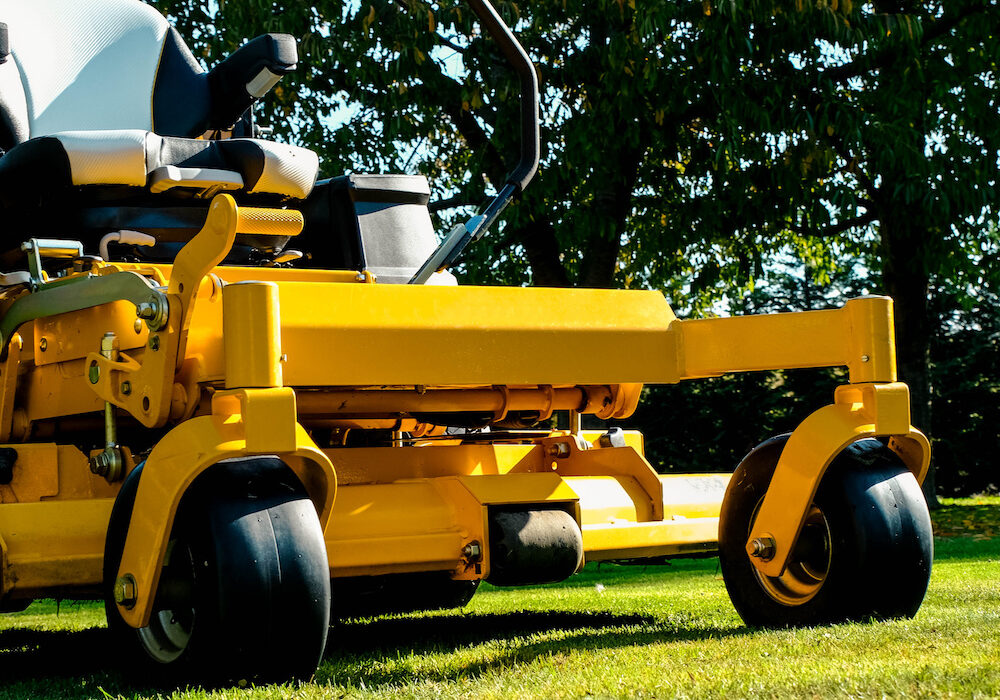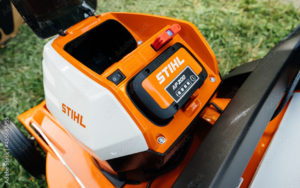Is Battery-Powered Equipment Right for Your Commercial Lawn Care Business?

The world is quickly modifying the way we do business, including lawn care and landscaping. With global climate change and emissions standards under intense scrutiny, many cities and countries are changing laws to reflect a greener workspace.
One way lawn care companies are evolving to fit this new eco-friendly world is by swapping gas-powered for battery-powered lawn care equipment. There are a variety of battery-operated tools to choose from, including:
- Lawn mowers
- Hedge trimmers
- Leaf blowers
- Trimmers and edgers
- Tillers
At Arborgold, we develop specialized software for field-based businesses like lawn care and landscaping companies. We know the work that goes into streamlining your business. Making a big move from gas to battery requires extra help.
Here, we’ll talk about the pros and cons of battery-powered lawn care equipment and important factors to consider as you make your decision.
Why Try Battery Powered Equipment?
Battery-powered lawn care equipment is a beneficial step for companies across North America and maybe the globe. Here are some reasons to consider the switch:
Going Green
The biggest reason to try battery-powered equipment is because eventually, it might be mandatory. Already, California has begun the transition by passing a law banning the sale of equipment causing SORE (small off-road engine) emissions by 2024. New York quickly followed suit, promising to ban equipment, off-road vehicles, and co
mbustion engine vehicles by 2023.
Cost
While initial costs are substantial, ongoing maintenance and charging costs are less compared to gas-powered mowers.
Commercial ride-on gas mowers, for example, uses roughly two and a half gallons of gasoline an hour. Multiply that by the current cost of gas and then again by the number of hours you mow on a standard day. For example, let’s say the cost of gas is about $3.8/gallon, that makes an hour of mowing $9.5. For an eight-hour day, you’re looking at about $76 in gas.
In comparison, a battery-powered mower uses rechargeable batteries. The cost of electric
ity to recharge a battery is a little tougher. First, find out how much you spend per hour of charging with the equation:
- kWh x hours charged/1000 = cost to charge per hour
- Now determine how much your electricity costs with the equation:
- Total power bill – taxes/total power use = cost of power
- Finally, multiply the answers from each equation together:
- Cost of power x cost to charge per hour = cost of electricity used to charge mower battery
You can use the electricity equation to determine the cost of electricity for all battery-operated tools.
Quiet
Anyone who’s ever mowed a lawn, used a chainsaw, or trimmed weeds with an edger, knows how loud gas-powered equipment gets. They pose time constraints on when you can start and stop work for the day.
Battery-powered units produce much less noise and vibration. Not only do you get a quieter workspace, but a more comfortable one.
Companies Producing Top Performing Battery-Operated Equipment
Choosing a new type of commercial lawn care equipment often falls to the manufacturer. If you’re going to make a switch in something as big as equipment type, you should do it with a company you trust.
There are plenty of online ratings and reviews to determine the best performing battery-operated equipment brands for yourself. At Arborgold, we tend to recommend the tried and tested companies producing high-performance equipment. Here are some of the top contenders in the field:
Greenworks Commercial
Greenworks commercial produces some of the top battery-powered equipment in lawn care, including the powerful 82V 42” Crossover Zero Turn Mower. They also make a variety of other battery-powered lawn care equipment, including:
- Power tools
- Leaf blowers
- Hedge trimmers
- Spring trimmers
- Tractors
- Utility vehicles
- Snow throwers
- Tillers
- Cultivators
Mean Green
Mean Green electric mowers and equipment produces some of the top electric mowers in North America. Their top battery-powered machines are the:
- Evo
- Rival
- Vanquish
- Nemesis
The most efficient mower, the Evo, provides operational savings of $12 to $15 an hour compared to gas mowers.
Gravely
Gravely has ride-on, stand-on, and walk-behind mower options. They also call say they are “the first all-day electric commercial zero-turn” mower. Their battery-powered mowers have swappable lithium-ion batteries to ensure lawncare crews continuously mow throughout shifts.
Next-Gen Battery-Powered Equipment Projection
According to Fortune Business Insights, North America is likely to have the largest share of battery-powered equipment in the future. With our governments updating laws to minimize carbon emissions, North American lawn care companies are leaders in the lithium-ion future of mowing.
This isn’t bad news for North Americans, as the 2028 value projections show a potential value of 40.86 billion for outdoor power equipment.
Things to Consider when Choosing Batter- Powered Lawn Care Equipment
Making the change from gas to battery is a big decision. There are so many factors to consider, including:
Battery Life for Full Day Use
There are two ways to extend battery power for a full day—swap batteries out or buy a long-lasting battery-operated lawn care tool.
The most common of these two scenarios is the former. Most battery-powered equipment won’t last an entire day on one charge, although the Mean Green Evo has 8-hours of continuous mow time.
The key to success is bringing multiple battery packs with you during the day. The number depends entirely on the type of equipment and how long the battery runs on each charge. This varies, but you can normally find the information in your user guide.
Cost vs. Long-term Battery
Long-term battery life is something you’ll pay for. A big decision as you choose the right battery powdered lawn care equipment for your company is to pay more for longer use or pay less but use more batteries.
The cost-to-value ratio is something you can work out mathematically. If your business does large quantities of work every week, it’s probably worth it to pay the extra for the long battery life. This can be a substantial leap in price from four to five-digit price tags.
Warranty Coverage
Warranty varies between brands and products. A good example of this is the Gravely mowers. Many of their mowers fluctuate in warranties of 2 to 5 years. Their electric mower has the following coverage:
- Battery: 3 years
- Charger: 5 years
- Mower: 5 years of 1500 hours (no hour limit on first two years)
Compared to gas mowers, this is a sizable warranty agreement. While the battery warranty phases out before the mower, it’s much cheaper to purchase a battery than replace an electric mower.
Ongoing Maintenance Needs
Ongoing maintenance needs for battery-powered machines are less than that of gas units. There are generally fewer moving parts to worry about in an electric mower. That combined with fewer fluids to factor into maintenance, it’s a less cumbersome job to upkeep battery-powered tools.
Rebates for No-Emission Equipment
More governments are incentivizing the change from gas to battery with rebate programs. The restrictions and amounts for these rebates are based on your location. Government rebates can be enhanced with brand rebates. Some lawn mower dealers are adding their own rebate incentives to the pot as well. Ask about rebates when you chat with your dealer.
Contact Arborgold to Learn More
Arborgold designs software for field-based businesses like yours. Our customized approach to business management targets every facet of your business, from productivity to invoicing to customer engagement.
Discover more ways to reduce costs and improve margins with business management software from Arborgold.
Share this resource




